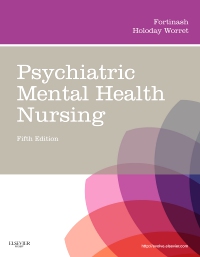
Psychiatric Mental Health Nursing, 5th Edition
Paperback

Focusing on what psychiatric nurses actually do in everyday practice, Psychiatric Mental Health Nursing, 5th Edition, uses a balanced nursing-medical approach to cover all of the most common disorders and treatments. The text's full-color illustrations and straightforward style help students make sense of more challenging material. And its strong emphasis on the nursing process, updated DSM-IV-TR diagnostic criteria, interdisciplinary interventions, and the latest mental health practices boost students' confidence in managing clients and prepare them for success on the NCLEX¨ examination.
-
- NEW! Enhanced readability makes it easier for students to understand basic knowledge and complex topics.
- NEW! Concept maps provide visual guidelines for care and highlight the nurse's role.
- NEW! Adaption to Stress chapter covers basic neuroanatomy and the psychobiological aspects of psychiatric disorders.
- NEW! Forensic Nursing in Clinical Practice chapter explains current therapies used in the treatment of physiological and psychological health problems and demonstrates the importance of the nurse's role in providing holistic nursing care.
- UNIQUE! Balanced nursing-medical approach offers strong baseline coverage of the nursing process and interdisciplinary interventions and focuses on what psychiatric nurses actually do.
- Complete coverage of the nursing process features the six-step problem-solving method and how to put it into practice.
- DSM-IV-TR Criteria boxes list categories of mental disorders and the criteria for diagnosing them.
- Nursing care plans provide care guidelines for each plan and include a brief case study, followed by assessment, diagnosis, goal setting, interventions with rationales, and evaluation.
- UNIQUE! Clinical Alert boxes address issues critical to the safety or well-being of the client.
- Case studies depict effective nursing care strategies and promote critical thinking.
- Research for Evidence-Based Practice boxes discuss the implications of current research studies.
- Client and Family Teaching Guidelines boxes focus on the issues confronting families when a member suffers from mental illness.
- UNIQUE! Medication Key Facts boxes highlight the most common psychopharmacologic interventions along with safe and effective use.
- Nursing Assessment Questions boxes include questions that should be asked in the assessment of a particular disorder.
- Clinical Symptoms boxes help students apply content to the real world.
- Additional Treatment Modalities boxes summarize other modalities and interventions used in conjunction with nursing interventions in the treatment of a particular disorder.
- Chapter summaries conclude each chapter with the most significant ideas to remember.
- Review questions with answers in the appendix offer immediate reinforcement of chapter content and help students prepare for the NCLEX Examination.
- Glossary provides concise definitions of key terms.
- Objectives and key terms emphasize the most important concepts from each chapter.
-
- UNIQUE! Enhanced readability makes it easier for you to grasp difficult material.
- UNIQUE! Concept map highlights the nurse's role in psychiatric care.
- NEW! Adaption to Stress chapter covers basic neuroanatomy and the psychobiological aspects of psychiatric disorders, and shows you how to manage stress.
- NEW! Forensic Nursing in Clinical Practice chapter explains current therapies used in the treatment of physiological and psychological health problems and demonstrates the importance of the nurse's role in providing holistic nursing care.
-
PART I: FOUNDATIONS FOR PSYCHIATRIC MENTAL HEALTH NURSING
1. Psychiatric Nursing: Theory, Principles, and Trends
2. Nursing Practice in the Clinical Setting
3. The Nursing Process and Standards of Care
4. Therapeutic Communication: Interviews and Interventions
PART II: BIOLOGIC AND PSYCHOSOCIAL PRINCIPLES FOR MENTAL HEALTH NURSING
5. Adaptation to Stress
6. Neurobiology in Mental Health and Mental Disorder
7. Human Development Across the Life Span
8. Culture, Ethnicity, and Spirituality: A Global Perspective
9. Legal and Ethical Aspects in Clinical Practice
PART III: PSYCHIATRIC DISORDERS
10. Anxiety and Related Disorders
11. Somatoform, Factitious, and Dissociative Disorders
12. Mood Disorders: Depression, Bipolar, and Adjustment Disorders
13. Schizophrenia and Other Psychotic Disorders
14. Personality Disorders
15. Substance Related Disorders and Addictive Behaviors
16. Cognitive Disorders: Delirium, Dementia, and Amnestic Disorders
17. Disorders of Infancy, Childhood, and Adolescence
18. Eating Disorders: Anorexia Nervosa and Bulimia Nervosa
19. Sleep Disorders: Dyssomnias and Parasomnias
20. Sexual Disorders: Sexual Dysfunctions and Paraphilias
PART IV: CRISIS AND PSYCHIATRIC EMERGENCIES
21. Crisis: Theory and Intervention
22. Suicide: Prevention and Intervention
23. Violence: Anger, Abuse, and Aggression
24. Forensic Nursing in Clinical Practice
PART V: THERAPEUTIC INTERVENTIONS
25. Psychopharmacology
26. Therapies: Theory and Clinical Practice
27. Complementary and Alternative Therapies
PART VI: NURSING INTERVENTIONS WITH SPECIAL POPULATIONS
28. Grief in Loss and Death
29. Emotional and Mental Responses to Medical Illness
PART VII: NURSING INTERVENTIONS IN THE HOME AND COMMUNITY
30. Community Mental Health Nursing for Patients with Severe and Persistent Mental Illness
